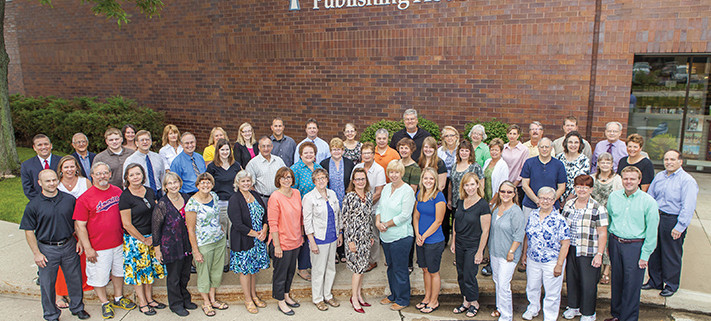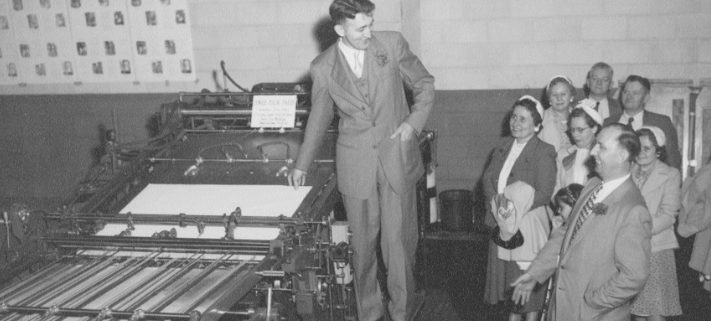NPH 125 Years and Counting: Beyond paper and ink
Northwestern Publishing House looks ahead to the digital world.
Raymond W. Schumacher
From the time of its incorporation in August 1891, Northwestern Publishing House (NPH) has served the publishing needs of the Wisconsin Synod. For much of its 125-year history, the work involved paper and ink. Books, Bible studies, brochures, music, curriculum, bulletin covers, tracts, certificates, and more—all were print resources.
Advances in technology have made it possible to communicate the message of Christ in different ways. It has also made it necessary for the synod’s publisher to adjust its vision and adapt to the changing ways people access the written word. So NPH looks to the future, aware that God’s people will want and need to receive Christ-centered resources in different ways.
Different ways to communicate the gospel
The difference is illustrated by the means God has used to reach souls with the message of Christ in two separate mission fields.
A Christian doctor in a predominately Muslim country understood how the printed Word could be the vehicle to strengthen the faith of believers and to introduce unbelievers to Jesus. Patients at his clinic sat in a waiting room that would seem humble to those accustomed to American clinic standards. Yet, it was well stocked with reading material. As they waited for the doctor to attend to their needs, patients could read a little booklet that, in clear and simple language, explained the message of sin and of God’s grace for us in Christ. Or they might have picked up one of several self-study Bible pamphlets and grown in their knowledge of Christ and in their faith. The Holy Spirit worked through the message of Christ the patients were reading. Many, who once bowed before false gods, became soldiers of the cross.
In a neighboring country, an ambitious Christian packed a solar-powered projector into a backpack and hiked into the mountains. He visited villages that aren’t served with electricity, where there is limited access to printed material, and where few people are able to read. Using a sheet as a screen, he would show the villagers a video presentation that told of Jesus’ life, death, and resurrection. Many who heard about Jesus for the first time came to believe.
You can probably think of examples in your own family or your own church that illustrate the same point. Perhaps you know of a recent retiree who bought a complete set of the People’s Bible—all 41 volumes—and made it his goal to read them all. He wants to grow in his understanding of the Bible so he can be a better mentor to the young leaders in his congregation. Though he is adept at using a computer and a smartphone, he prefers a printed book for his study of Scripture.
Perhaps you have a relative whose tastes are different. Living and working in one of our nation’s largest cities, she is thankful that she can access biblical resources digitally. Her long commute to work inserts a ready-made time slot into each day. At her seat in the commuter train she can read the Bible, a devotion, and prayers, all on the screen of her phone. And one evening each week she meets onscreen with her pastor and several other members of her church who are scattered around the large metropolitan area, and they study the Bible together.
Those situations all reveal that the work of the synod’s publisher is broader than it once was. Although a large segment of the population prefers to have a book in hand and to read words that are printed with ink on paper, others enjoy the convenience of being able to grab guidance and strength from God’s Word whenever they want, wherever they are, and with whatever device they happen to have on hand.
Meeting people wherever they are
Even as NPH adjusts its focus beyond printed pages stored on pallets and distributed from a central warehouse, God is already blessing the effort. More than 160 titles are already available in e-book format through Amazon and Barnes & Noble. We can only wonder about the ways God may be building people up through resources that faithfully proclaim God’s Word.
A casualty of extreme and severe suffering may be searching for understanding and strength. Still smarting from the pain of losing a loved one, a person who doesn’t know Christ may be looking for clues to the meaning of life. A young father may be reaching out for help as he seeks to lay a firm spiritual foundation for the family the Lord has given him. A lifelong learner may just be curious about what the Bible says about angels. Bewildered students, overwhelmed by all the confusing and contradictory messages that swirl around them each day, may be looking for help to sort out the truth. A Christian psychologist may be searching for the proper Christian perspective on mental illness. A sinner, who has carried a burden of guilt for a lifetime, may be desperately looking for rescue. All can find resources that hold up the cross of Christ as they answer questions, offer hope, and point to the Savior whose forgiveness is unconditional and complete.
For decades, the Meditations devotions have served as a tool for spiritual strengthening. Today, in addition to 90,000 print copies, Meditations is available as an app for iPhones and iPads. About 41,000 individuals have downloaded devotions through the app; 1,500 have signed up for an annual subscription. What is perhaps most remarkable is that people from 150 different countries have downloaded the app—from such unlikely places as Iran, Saudi Arabia, and the Philippines. Forward in Christ has also taken a step into the world of digital distribution. Each issue is available in print and digitally.
Changes in technology are also changing the way church workers carry out their ministries and the kinds of resources they need. Teachers work in an environment that relies more and more on computers, interactive whiteboards, projectors, and tablets. They benefit from materials that offer more visual and dynamic tools as they teach God’s Word to students who learn with a variety of learning styles.
Choir directors have long relied on NPH to provide quality music that offers more than just catchy tunes to make you feel good for a time, but music that proclaims a message of peace and hope for eternity. With the ability to download and print just the number of copies they need, choir directors are saving financial resources that can be directed for other ministry work.
Pastors have access to 115 books that are integrated with the Logos Bible Software, helping them as they study the original biblical languages and the Lutheran Confessions.
In our rapidly changing world, the methods and tools used by the synod’s publisher will also change. But printed books, e-books, apps, digital files—or whatever else might come in the future—have real value only if they faithfully proclaim the message of Christ. Thank God that for 125 years NPH has maintained that focus. We pray that it will always be so.
Ray Schumacher, an editor at Northwestern Publishing House, is a member at St. Peter, Helenville, Wisconsin.
This is the final article in a two-part series on Northwestern Publishing House and the printed word.
Learn more about Northwestern Publishing House at www.nph.net.
SUBMIT YOUR STORY
Do you have a manuscript, idea, or story from your own life you’d like to share for use in Forward in Christ or on wels.net? Use our online form to share it to our editorial office for consideration.
SUBSCRIBE TO FORWARD IN CHRIST
Get inspirational stories, spiritual help, and synod news from Forward in Christ every month. Print and digital subscriptions are available from Northwestern Publishing House.
Author: Raymond W. Schumacher
Volume 103, Number 9
Issue: September 2016
Copyrighted by WELS Forward in Christ © 2021
Forward in Christ grants permission for any original article (not a reprint) to be printed for use in a WELS church, school, or organization, provided that it is distributed free and indicate Forward in Christ as the source. Images may not be reproduced except in the context of its article. Contact us


